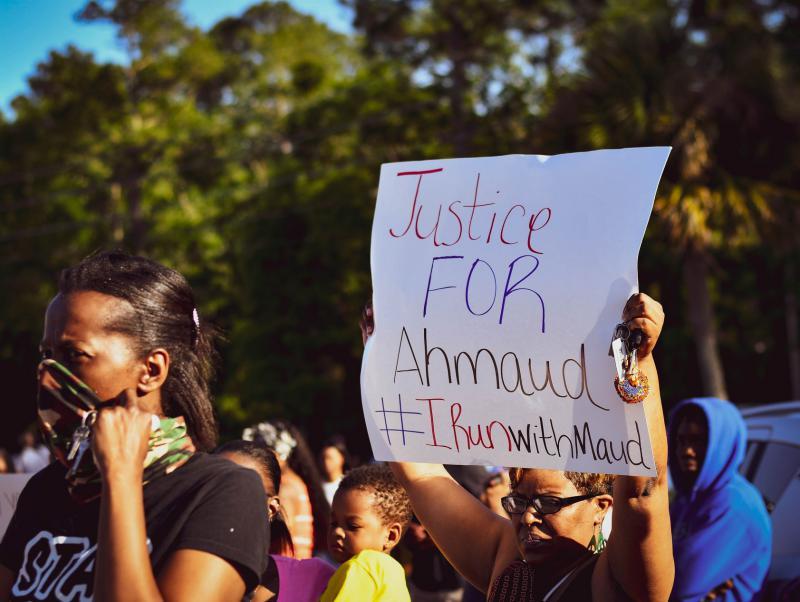Section Branding
Header Content
Breaking Down Georgia's Citizen's Arrest Law After Ahmaud Arbery Fatal Shooting
Primary Content
Two men who shot and killed an unarmed black jogger in Coastal Georgia said they did so in accordance with Georgia's citizen's arrest law.
Police have neither arrested nor charged father and son Gregory and Travis McMichael in the Feb. 23 shooting death of 25-year-old Ahmaud Arbery. Renewed interest in the case surfaced when video of the shooting was leaked earlier this week.
An unidentified witness filmed Arbery being pursued by the McMichaels in a white pickup truck. In the video, the elder McMichael is seen in the bed of the truck holding a handgun, while Arbery wrestles with 34-year-old Travis McMichael, who has a shotgun.
Three shots are heard before Arbery falls to the ground, never to recover.
PREVIOUS COVERAGE: Leaked Video Of A Deadly Shooting In Coastal Georgia Sparks National Outrage
Atlanta civil rights attorney L. Chris Stewart said this case does not fit the proper description of a citizen's arrest.
Georgia's citizen's arrest law requires that the offender must have committed a crime in the presence of another person, or that person must have "immediate knowledge" of a crime that has taken place by the perpetrator.
Stewart said that to see a black man jogging down the street and assume he's a criminal, grab guns and chase him down is ridiculous.
"It's insanity to even attempt to try and call that citizen's arrest," Stewart said.
The video appears damning to the case, but Ware County District Attorney George Barnhill thought it exonerated the McMichaels. Barnhill was the second DA to recuse themself in the case.
Brunswick District Attorney Jackie Johnson recused herself from the case almost immediately because Gregory McMichael had previously worked in her office as an investigator. Barnhill only recused himself after Arbery's mother raised objections. Atlantic Judicial Circuit DA Tom Durden is now handling the case.
Durden on Tuesday, May 5, formally requested help from the Georgia Bureau of Investigation. The GBI assigned the case to three supervisory-level investigators on Wednesday, May 6.
Gregory and Travis McMichael told police that Arbery matched the description of someone caught on a security camera committing recent break-ins in the neighborhood.
Barnhill said in a letter recusing himself from the case that Gregory and Travis McMichael were acting in accordance with the law.
"It appears their intent was to stop and hold this criminal suspect until law enforcement arrived," he wrote. "Under Georgia law, this is perfectly legal."
In that same letter, which was obtained by The New York Times, Barnhill said the shooting of Arbery was in self-defense. Georgia's "stand your ground" law passed in 2006 says a person using force in self-defense has "no duty to retreat and has the right to stand his or her ground."
RELATED: Lack Of Charges In Glynn County Shooting Brings National Media Attention
This isn't the first time Georgia's citizen's arrest law has been questioned. The courts have previously ruled that while a citizen can detain someone, a citizen's arrest doesn't necessarily allow for uses of force.
In the 2004 case Patel vs. State, a convenience store owner shot an intruder who broke into the store after the store owner told him to halt. The Georgia Supreme Court found that even though Viral Patel had attempted to stop an intruder, the measure of force used was disproportionate to the circumstance.
"The only force reasonable under the circumstances may be used to restrain the individual arrested," the state supreme court said in its ruling. "The use of unreasonable force could not have been part of a legitimate citizen's arrest.”
In the 2017 case Edwards vs. State, a man chased someone whom he thought had burglarized his home. The homeowner attacked the man with a baseball bat. The court also found in that case that unnecessary force was used and it was not a legitimate citizen's arrest.
"Edwards' alleged assault of the individual with a baseball bat entailed the use of unreasonable force, and could not have been part of a legitimate citizen's arrest," the court ruled.
Stewart said that if the video of Arbery had not been made public, there is a chance that none of these questions would have ever been raised.
PREVIOUS COVERAGE: UPDATE: GBI To Investigate Shooting Of Unarmed Black Man
"Video has the power of the truth, because in these situations the victim is dead," he said. "And you only have the people who killed him as the witnesses."
Stewart argued there should be an independent inquiry by the Department of Justice into the case, and that one of the biggest missteps has been the refusal to charge Arbery's killers.
"They need to open a case and investigate it for a crime because it fits directly with the statute for a hate crime," he said. "You know, they attacked and killed somebody based on their color."



